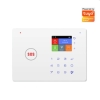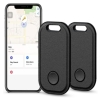Alarm Systems Sensors Buying Recommendations
What are Alarm Systems Sensors?
Alarm systems sensors are essential components of security setups and play a crucial role in detecting intrusions or unauthorized activities in a designated area. They come in different types and designs for numerous applications to help secure homes, businesses, and other establishments.
Features of Alarm Systems Sensors
Alarm system sensors come with the following features:
Various Detection Methods: These sensors use different methods such as infrared, motion detection, and magnetic contacts to track unauthorized access effectively.
Wireless or Wired Options: Alarm sensors have both wireless and wired configurations, allowing users to choose based on their convenience and requirements.
Customizable Sensitivity Levels: Depending on the environment and the user's preferences, alarm sensors offer customizable sensitivity to minimize false alarms and optimize efficiency.
Tamper Protection: High-quality alarm sensors have built-in tamper protection to ensure they keep functioning even if an intruder attempts to disable them.
Integration with Smart Home Technology: Advanced alarm sensors can integrate into smart home systems for remote monitoring and control.
Application of Alarm Systems Sensors
Alarm systems sensors cover a wide array of applications:
Residential Security: Sensors installed on doors and windows can detect unauthorized entry in residential properties, protecting families and their assets.
Commercial Security: Businesses use alarm sensors for securing offices, warehouses, retail spaces, and other establishments.
Industrial Security: In sensitive facilities like power plants, alarm sensors help secure restricted zones and protect valuable equipment from damage or theft.
Medical Facilities: Hospitals and medical centers deploy sensors to monitor restricted areas, protect sensitive equipment, and ensure patient safety.
Public Safety and Infrastructure: Alarm sensors play a crucial role in public security, combating vandalism and theft in public areas and assisting in the security of transport hubs, utility installations, and other critical infrastructure.
Why Are Alarm Systems Sensors So Important?
Alarm systems sensors are crucial for the following reasons:
Early Detection of Incidents: These sensors can detect break-ins, fires, and other emergencies before they escalate into more severe problems.
Around-the-Clock Protection: Alarm systems sensors provide 24/7 monitoring for homes and businesses, offering peace of mind to users.
Deterrent to Intruders: The presence of alarm sensors can deter potential intruders, reducing the likelihood of crime.
Save Time and Resources: Quick response time to incidents and the prevention of theft and property damage help save time and money for homes and businesses.
Supporting Law Enforcement: Alarm sensors aid law enforcement agencies and other security personnel in their efforts to prevent crime and maintain public safety.
How to Maintain Alarm Systems Sensors
Step 1: Regular Inspection
Conduct regular inspections of your alarm systems sensors. At least once a month, dedicate time to visually examine each sensor for dust, dirt, damage, or signs of wear. Regular inspection will help you identify any issues that might hinder the system's effectiveness.
Step 2: Clean the Sensors
Dirt and dust can accumulate on sensors, which can impact their performance. To guarantee the proper functioning of your alarm systems sensors, gently wipe them down using a clean, dry cloth.
For infrared motion detectors, be especially cautious with the lens when cleaning. You can use a soft brush to remove any dust or debris gently.
For window and door contacts, ensure that the contacts are clean and free of dust. This is essential for maintaining a proper magnetic connection.
Avoid using harsh chemicals or abrasive materials, as these can damage the sensors.
Step 3: Check for Loose or Damaged Wiring
Loose or damaged wiring can often be the cause of false alarms. Make sure to inspect the wiring for each sensor, ensuring that no exposed or frayed wires are present. If you discover any issues, contact a professional to assess and repair any necessary components.
Step 4: Test Your Alarm System Regularly
Testing your alarm system ensures that it remains fully functional. At least once or twice a year, activate the testing mode on your alarm system to ensure that each sensor is responding correctly.
Test each contact sensor by opening and closing the corresponding doors or windows.
Test motion detectors by walking within their detection range.
Ensure that your alarm system communicates properly with the monitoring center or your connected mobile devices.
Step 5: Replace Batteries
To ensure that your sensors stay active, replace batteries as needed. Regularly monitor the battery levels and replace them according to manufacturers' recommendations or when the battery indicator alerts you.
Step 6: Consult Professionals
When in doubt, consult with professionals. Regular professional inspections of your alarm system, typically once a year or as recommended by the manufacturer, are an excellent way to detect and address any issues before they escalate.
Sales and Prices of Different Types of Alarm Systems Sensors
Door and Window Sensors
These sensors monitor and protect the most common entry points for intruders - doors and windows. They are designed to detect movements, such as the opening and closing of doors and windows, and send a signal to the central alarm system.
Sales: Door and window sensors are among the most popular types of alarm system sensors, with steady sales throughout the year. Market penetration is significant, and demand is driven by both new installations and replacement needs.
Prices: Prices for door and window sensors vary depending on the brand, features, and technology. They generally range from15to60 per sensor.
Motion Sensors
Motion sensors use infrared technology to detect movement within a specific area. They are particularly useful in large spaces and offer an additional layer of protection beyond door and window sensors.
Sales: Motion sensors are continuously gaining popularity due to their efficiency and ease of use. Sales remain consistently strong, and the broad adoption of smart home technology is expected to further boost demand.
Prices: Depending on the technology and coverage area, motion sensors can cost between 20and100 each.
Glass Break Sensors
These sensors are designed to specifically detect the sound of breaking glass, making an ideal addition to window sensors in protecting a property.
Sales: Although not as popular as door and window or motion sensors, glass break sensors still enjoy a niche market with consistent sales figures. They are particularly favored for their added level of security in certain high-risk environments.
Prices: Glass break sensors range in price from 20to80, depending on factors such as brand and sensitivity.
Smoke and Heat Detectors
These sensors act as an early warning system, detecting smoke, carbon monoxide (CO), or heat from fires, and are a vital component of any comprehensive alarm system.
Sales: Smoke and heat detectors are mandatory in many jurisdictions, which contributes to substantial and consistent sales. The global push for increased safety awareness sustains a strong demand for these devices.
Prices: Prices for smoke and heat detectors can vary widely depending on the specific features and certifications, but typically they range from 20to150.
Water Leak Sensors
Water leak sensors provide early detection of water leaks and flooding, helping to reduce property damage and the loss of valuable possessions.
Sales: Water leak sensors are increasingly popular, especially in flood-prone areas or areas with extreme weather conditions. Their adoption is still growing and is predicted to continue in the future.
Prices: Water leak sensors are relatively affordable and typically cost between15and100.
Alarm Systems Sensors Common Technical Troubleshooting FAQs
Q: My alarm system is not detecting any motion. What could be the problem?
A: The issue might be dead batteries, incorrect placement of the sensor, or a malfunctioning motion sensor. Replace the batteries, adjust the sensor's placement, or consider a professional check.
Q: Why is my alarm system frequently giving false alarms?
A: False alarms could be triggered by pets, insects, or improperly placed sensors. Make sure the sensors are placed in optimal locations and adjust sensitivity settings if applicable.
Q: My alarm system's sensors are not responding. What do I do?
A: Check for dead batteries, interference from other devices, or damaged sensors. Replace batteries, relocate the system, or consult a professional for repair or replacement.
Q: How often should I perform maintenance checks on my alarm system's sensors?
A: Conduct regular maintenance checks, ideally quarterly, to ensure optimal functioning and battery life.
Q: My alarm system's sensors seem to be working, but the control panel isn't responding. What's wrong?
A: The control panel may not be receiving signals due to weak connections, damaged wiring, or dead batteries. Inspect the connections and replace the batteries or wiring if needed. If the issue persists, consult a professional.
Suppliers of Alarm Systems Sensors
If you want to buy Alarm systems sensors, or have questions about the types of Alarm systems sensors, please leave us a message. iBirdView is your best choice. As professionals in the surveillance system industry, we are steadfast in our commitment to providing efficient, reliable, scalable and seamlessly integrated solutions to meet the needs of our valued customers. Not only can we help you choose the Alarm systems sensors that best suit your needs, we can also provide comprehensive after-sales services, whether it is about the operation, repair or maintenance of Alarm systems sensors.
Welcome to contact us to get the latest price of new Alarm systems sensors. Competitive price, reliable quality, waiting for you to buy!


